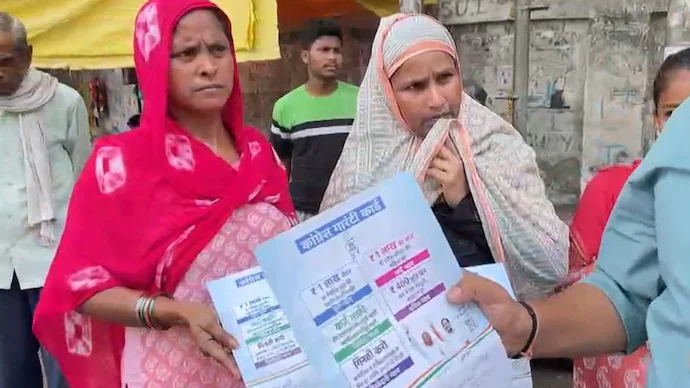On June 4, the results for the Lok Sabha elections were declared, producing outcomes that surpassed the predictions of both psephologists and the exit polls. The Bharatiya Janata Party (BJP) emerged as the largest party in the country.
The final tally revealed that the NDA, consisting of the BJP, JD(U), TDP, and other allies, secured 292 seats, well above the 272-seat majority required to form the government. Of these, the BJP alone claimed 240 seats, while Nitish Kumar’s JD(U) won 12 seats, and Chandrababu Naidu’s TDP secured 16 seats, contributing a combined total of 28 seats to the NDA’s victory.
Conversely, the INDI Alliance, which includes the Congress, Trinamool Congress (TMC), Aam Aadmi Party (AAP), Samajwadi Party (SP), and others, obtained a total of 234 seats. Within this alliance, the Congress secured 99 seats, the Akhilesh Yadav-led SP won 37 seats, and the TMC claimed 29 seats.
In a surprising turn of events, several women in Lucknow queued outside a Congress office, demanding ‘guarantee cards’ that the party had promised during its campaign. The Congress had distributed these cards, pledging Rs 1 lakh annually to the woman head of every poor family.
Visuals released on June 5, showed a large number of Muslim women standing outside the Congress office in the sweltering heat.
While some demanded ‘guarantee cards’, others who had previously received them were submitting forms to claim the promised money. Some women reported receiving receipts from the Congress office after submitting their details to receive the funds.
The Congress had launched the ‘Ghar Ghar Guarantee’ program, under which leaders were tasked with reaching out to nearly 80 million households to inform them of its 25 guarantees.
The Congress party’s ‘guarantee card’ highlights the promises made in their manifesto. Congress President Mallikarjun Kharge launched this campaign on April 3 in New Delhi.
The guarantee card outlines several key promises, including Rs 1 lakh annually for every educated youth under the Youth Justice Scheme and Rs 1 lakh annually for every woman from poor families under the Women’s Justice Scheme. Additionally, it pledges a minimum daily wage of Rs 400 under the MGNREGA program and legal guarantees for MSP based on the Swaminathan formula, along with loan waivers.
The card provides spaces at the bottom for filling in personal details such as name, age, number of voters in the household, address, and mobile number. It also features a QR code.
Congress workers were given the responsibility of distributing these guarantee cards door-to-door. Even after the elections, they continue to hand out the cards, collect the necessary information, and provide receipts to help people claim the benefits promised by the party.
Among these promises was the Mahalakshmi scheme, which guaranteed Rs 8,500 per month directly credited to the accounts of women heads of families belonging to the Below Poverty Line (BPL) category.
This scheme is similar to the Gruha Lakshmi guarantee scheme of the Congress-led Karnataka government, which provides Rs 2,000 per month to women heads of poor families.
Recently, the General Post Office in Bengaluru saw a rush of women opening accounts in anticipation of the monthly deposit of Rs 8,500, should the INDI Alliance come to power at the Centre.



















Comments